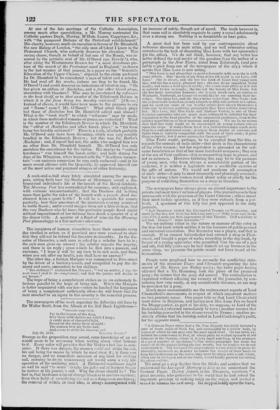The newspapers of the week republish the following old lines
by Sir Walter Scott, from the Album at the Bell Rock Lighthouse- " PHAROS LOQUITUR.
Far in the bosom of the deep, O'er these wild shelves my watch I keep ; A ruddy gem of changeful light,
Bound on the dusky brow of night : The seamen bids my lustre hail,
And scorns to strike his timorous sail.
July 30, 1814. WALTER SCOTT."
Strange as the proposition may sound, some knowledge of an art would seem to be necessary when writing about what belongs to it. Every sailor will perceive that Sir Walter's last line is non- sense. If there was danger, the seamen could ;tot strike his sail, his sail .being the means by which he must clear it ; if there was no danger, and no immediate occasion of any kind for striking sail, scorning to do an unnecessary net would seem a very idle operation of' the seafaring mind. A Richmond coachman might as well be said "to scorn" to take his jades out of harness beiore he arrives at his journey's end. Why the deuce should he ? The fact is, that landsmen commit strange blunders in matters nautical; from their habit of considering the sail as a dangerous machinery, the removal of which, in their idea, is always accompanied with
an increase of safety, though not of speed. The truth however is, that some sail is absolutely requisite to carry a vessel wholesomely over a stormy sea. Nothing is so formidable as bare poles.


















 Previous page
Previous page